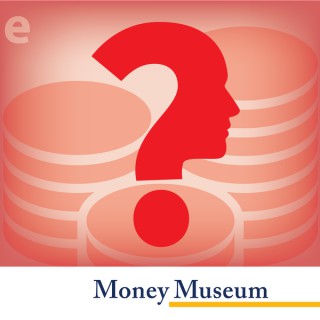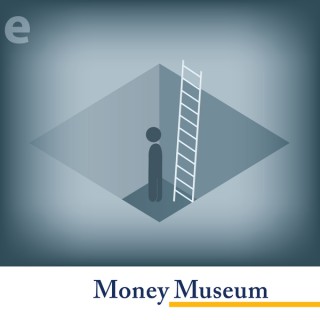What is Money?
Follow What is Money?The fact that money possesses such great a power is not rooted in the thing itself but in the specific social coherence which it induces and from which it derives its power. It is this social coherence we are going to explore.
- Jun 19, 2017 LATEST EPISODE
- infrequent NEW EPISODES
- 4m AVG DURATION
- 23 EPISODES
More podcasts from MoneyMuseum
Latest episodes from What is Money?

oikos, modern: The extremely elevated capacity of people pressured by money to produce more with less effort and to distribute products more precisely would absolutely be useful - it just ought to be organised differently than it is with money and its constraints.

Commoning: The commons movement counters money-mediated provisioning with collective participation in the activities and basic concerns of provisioning such as ownership. The movement’s core conviction is that only the community can decide on its common endeavours.

«Good» Money: Money should be crisis-free, a kind of money that ignores certain disadvantages and limits itself to its benefits. Other approaches use alternative forms of money, underneath the reign of world money, that deviate in tangible ways from its logic.

Market: A coherent market with a common pricing structure only emerges towards the end of the 16th century in Europe. This development gave the market economy its name and coincided with the transformation of money into the universal medium of exchange.

Purchasing: Buying replaces the all-encompassing social bond with one single obligation: to pay something to someone. Thus buying is both obligatory liquidation and the liquidation of the obligation.

Gifts: In communities that have no money in the modern sense, the presentation of gifts is crucially important. The gifts are not swaps; rather, along with other customs, they confirm and reaffirm a basic bond people have with one another.

Thought reflexes: Just as we can buy anything and everything with money, we also view and judge anything and everything in the form it acquires through money: as a value among values - even when we’re not involved with money-related things.

Subject / Object: Descartes was the first to formulate the then-new notion of a world split into subject and object. It implies the world is split into the determining, money, as subject and that which it determines, the commodity, as object.

Function and progress: Money requires everyone to think of goods as both the respective thing itself and its monetary value, that is, purely quantitatively. This results in a way of thinking which also induces a new way of calculating, the concept of functions in mathematics.

Money forms people’s thinking by forcing them to cope with its restraints regularly. Yet it also imposes them certain ways of unconscious thinking. In the modern age, money influences a lot in this way, no less than the natural sciences and philosophy.

The world as environment: Individuals see themselves as a singular interior element surrounded by an all-encompassing exterior. And so it is that monetized individuals regard the world as a mere externality, as if they themselves would not belong to it.

Society: Every person must do something for others in order to get money. But he doesn’t exert himself for them because he knows them, and they don’t pay him money because they want to contribute to his livelihood; rather, everyone seeks of coming into money.

Individual: Money benchmarks everyone as an individual owner of money, and it positions this individual within the anonymous universe of all other money owners. This abstract reference forms a distinct instance of the “I” as a conceptually pure form of self.

The State: No coin, no bill, no number on an account can force anyone to use them as money. It is governments that impose and maintain this compulsion. The states themselves depend on money, and want as much of it as possible to be generated in their own currency.

Command: All over the world people are compelled to sell something in order to get money that they need for living. Basically what most people have to sell is their labour. Those who buy with money appropriate control over the work of the others.

Property: There are inclusive and exclusive forms of ownership. Our money imposes a private ownership that rigorously excludes everyone from everything they haven’t paid money for.

Rich and Poor: More money, more prosperity for all: This promise is not being fulfilled. As time goes by, the poor grow poorer and the rich richer. Money’s continuing usage is based on its function as capital: the more money that’s invested, the more it can yield.

Growth: In a society where people depend primarily on money for their livelihoods, they have to get more money for what they do than they expend on doing it. This necessity alone drives the inexorable compulsion of money to become more money.

Growth: In a society where people depend primarily on money for their livelihoods, they have to get more money for what they do than they expend on doing it. This necessity alone drives the inexorable compulsion of money to become more money.

Digital Money: From the moment a society bases its economy on money, the value of money no longer needs its substance. Money’s value comes from the fact that it can be exchanged to purchase goods of the same value. Monetary value consists solely in this function.

Coins and bank notes: Before coins were minted, lumps and bars of precious metals, among many other things, were used as objects of payment. With coins, all these objects of payment acquired a standard. Only then did they also become a medium of exchange.

Archaic means of payment: In archaic times payments were made to satisfy an obligation, whether a debt or a wrongdoing. Many things could be used for payments. Archaic payments are indeed the origin of our money but they are far from being the same as our money.

The fact that money possesses such great a power is not rooted in the thing itself but in the specific social coherence which it induces and from which it derives its power. It is this social coherence we are going to explore.

















